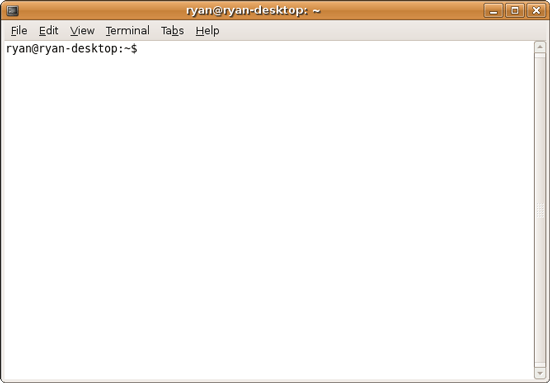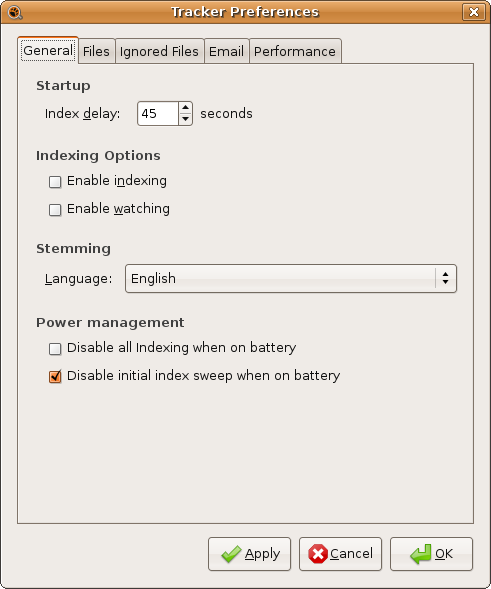Revisiting Linux Part 1: A Look at Ubuntu 8.04
by Ryan Smith on August 26, 2009 12:00 AM EST- Posted in
- Linux
The User Experience
Now that we’ve had a chance to go over the various features of Ubuntu and its included applications, we can get to the burning question: how is it?
In a nutshell, my own experience with Ubuntu has been that it’s capable of meeting 95% of my daily needs, and 75% of my weekly needs. Outside of the lack of the ability to sync my iPhone (which again is Apple’s fault), on any given day I did not need to boot up Windows. However in any given week I would need to boot in to Windows upwards of several times to run various Windows programs that don’t work under Wine or have a doppelganger for Ubuntu, not counting Windows games which also required booting back in to Windows. The result was that there was more dual booting than I would have liked, but it was acceptable.
What worked best for me under Ubuntu were the most common tasks, which makes sense given Ubuntu’s focus. We’ve already hit on how great Firefox is under Ubuntu, but also music playback, email, and word processing worked well. There was never any point where I felt like I could absolutely not accomplish something related to these tasks when using Ubuntu. However with that I will put the disclaimer that I didn’t find Ubuntu to be significantly better at any of these tasks – it was merely good enough.
If this sounds boring, it is. There’s not a lot to be said about otherwise mundane things that work well. Windows and Mac OS X could do these things, and so could Ubuntu. The distinguishing factor here really isn’t functionality; it’s that all of this was free.
In many situations Windows would still offer a better experience than Ubuntu. Sometimes this is a more polished GUI, as it is Ubuntu often looks like an orange version of Mac OS 9 (the bad Mac OS). Other times this would come down to professionally developed programs having an extra feature or two that while not critical, were nice to have. There are numerous little things like these that still keep Ubuntu well-separated from Windows and Mac OS X.

One item where I feel Ubuntu failed in particular is CLI use, which was a condition I outlined earlier. I wasn’t able to avoid using the CLI under Ubuntu, in fact I didn’t even come close. Some of this comes down to the fact that user generated support often uses CLI commands in lieu of instructions for dealing with the GUI, and in other situations such as mounting ISOs and installing video card drivers the situation was completely unavoidable. These are correctable problems.
Along those lines the default configuration of Ubuntu leaves me scratching my head. For example, Ubuntu has a file indexer and search system ala Windows Search and Spotlight. For whatever reason this indexer is not enabled by default and as a result it’s quite easy to miss. By the same token Compiz defaults to not using v-sync, which means windows will tear when moved. This is something hardware accelerated compositing specifically exists to solve. These items, along with finding a way (any way) to install the Microsoft Core Fonts by default so that the font disparity no longer exists would make the initial experience a better one.

The biggest negative influences in the Ubuntu experience were the items we listed under Things That Went Wrong. It’s easy to pick at things that don’t work, but these also happen to be the things that drove me out of Ubuntu for that moment. Meanwhile the biggest positive influences come down to Firefox and Totem. Neither is perfect, but as I discussed in their respective sections they’re great programs that are much better than the default programs found with Windows and Mac OS X.
Overall I found the Ubuntu experience to be decent, but not spectacular. Next to any issues listed out above, there’s a general lack of killer applications. As a result unless you specifically value the fact that it’s free (in either sense of the word) or the security benefits of it not being Windows, then there’s really nothing there that makes Ubuntu compelling compared to Windows or Mac OS X.










195 Comments
View All Comments
Guspaz - Wednesday, August 26, 2009 - link
"Not that it would necessarily be of much use, the last time I saw any statistics for instant messaging network usage, the vast majority of North American users were on AOL’s AIM network."IM use is highly regionalized. As such, AIM is clearly the dominant IM in the USA. However, Canada is dominated by MSN Messenger, and has been for many years (most of us migrated from ICQ to MSN around the release of Windows XP, I believe, due to the bundling of then Windows Messenger).
So, if Canada is dominated by MSN, while I can't speak for Mexico, it's misleading to claim that "the vast majority of North American users". As a Canadian, I can't think of anybody I know in person that uses AIM. They all use MSN or Google Talk without exception.
Aclough - Wednesday, August 26, 2009 - link
For myself, the thing that most bugs me when I have to go back to Windows is all the missing features from the window manager. I've come to rely on having multiple workspaces on my desktop, but I can adjust to having just one fairly easily when I'm not working on a lot of different stuff at once. What really bugs me, though, is how much more effort it takes to move or resize windows in Windows. On Linux I can press ALT and then click anywhere on the window, but with Windows I have to carefully click the title bar or the very edge of the window and that takes a noticeably longer time once you're used to doing things differently.Oh, and I find that the Linux scheduler seems to be noticeably better than the Windows one in preserving responsiveness when the system is under load.
fumacapena - Wednesday, August 26, 2009 - link
Great article!How about some benchmarks of "minimal" distros (like Puppy, Tine Core, ...)??
I like the idea of "ressurect" an old PC, but I would like to see benchmarks in Quad Cores, i7 too!
Anandtech is great, Bench(beta) is awesome!!
(sorry by bad english)
Thanks
InGraphite - Wednesday, August 26, 2009 - link
A few months ago most major trackers unbanned Transmission, but it still doesn't seem to be universally accepted on private trackers.I remember offhand (I could be wrong) that the main gripe was due to the fact it made excessive queries and thus flooded trackers with requests, or had the ability to.
chomlee - Wednesday, August 26, 2009 - link
I think you really need to mention the big picture here.I myself just tried Ubuntu for the first time 2 months ago and although I will admit that I have spent up to 8 hours trying to figure out how to install a specific program (before I found out there was a way to get the package manager to find the install), and I wanted to smash my computer at times. Now that I have learned quite a bit more, I realized that the few things I have installed worked great and flawlessly.
Anyhow back to the big picture. I can understand some of your concerns with how the OS will work with specific programs but what I have found is that most people I know use their computers for 2 things email and web browsing. Most of these people are constantly having problems with the system running too slow and cant seem to get rid of hidden viruses/malware. So I think that those people could easily be much happier with a simple OS like Ubuntu just for email and web browsing (And I would get a heck of alot of less calls from my dad asking my why his computer is running too slow). Lets also not forget that everything is moving to be browser compatible (like you mentioned).
Also, for people like myself, I use my Ubuntu system for a file server as well as a media center (XBMC is Awesome).
So, yes, for burning DVDs/CDs/Playing Games/Microsoft Office, I see no reason why you wouldn't use windows, but I think 95% of the users would be perfectly fine with ubuntu which is something that Mr Bill would not be very happy about when the public realizes this.
Keno - Thursday, August 27, 2009 - link
I think you have missed one small but important part.I am Ubuntu user since 8.04. I came to Linux because of the constant treat of viruses.
Last month I have installed 7 and it is very user friendly and I think it is very user frinedly but after Avira Antivir got crashed by virus I installed Kaspersky INternet security 2010. then it took almost twice as long to boot. Then I gladly returned to Ubuntu 9.04. Because MIcrosoft can not exist without Antivirus I think you should do some real benchmarking and test windows WITH Antivirus.
On Ubuntu I have ClamWin just in case i get some files from Windows users:)
Thanks
ioannis - Wednesday, August 26, 2009 - link
just wanted to point out that you can install software under the LiveCD. Of course it does not install on the hard drive. It remains on a ram-drive, so when you reboot, it's gone. It's still useful, if you wish to test out some package or perform some task with a tool not installed by default on the LiveCDstrikeback03 - Wednesday, August 26, 2009 - link
Even more useful (and not mentioned) is that Ubuntu can easily run off a flash drive, and more recent versions even include a GUI tool for installing it to one. Then all installs and other changes are saved from session to session, and everything runs much more quickly than the LiveCD.Mr Pearce - Wednesday, August 26, 2009 - link
It would be great if you could do more articles on compiler and especially driver performance differences. That was the most interesting part of this article.Ryan Smith - Wednesday, August 26, 2009 - link
This is what Part 2 will look at. I can compile some stuff by hand to see if it closes the Windows/Ubuntu gap, and I have plenty of video cards on hand to test what I can when it comes to graphics.